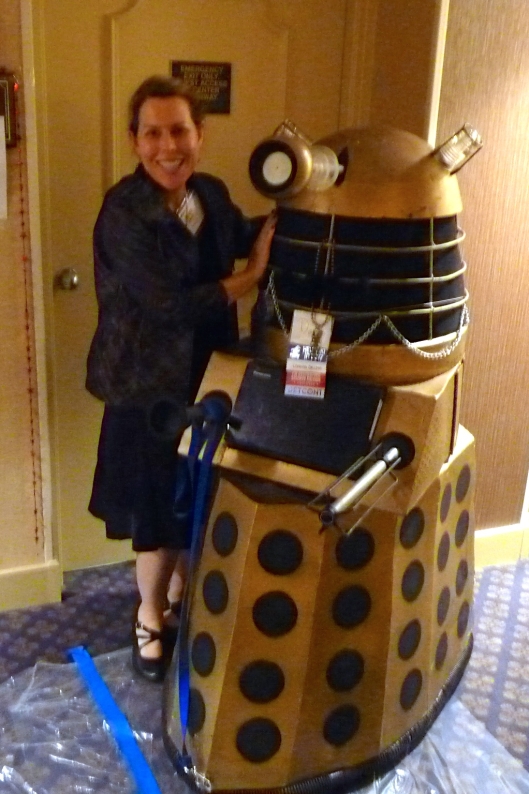I’ve returned from another glorious weekend at WisCon, the World’s Leading Feminist Science Fiction Convention. Excellent panels and discussions–more about those below. But first, photos!
When I arrived in Madison late on Friday, the sky was all vermillion and dreamy. It boded well.

Next, I befriended an imposing Dalek. This stunning creature was fashioned from an old washing machine, a toilet plunger, a microwave door, and an upside-down wok. I desperately wanted to crawl through the hatch in the back, all the better to control the Dalek from within(!), but I couldn’t get through the hatch without risking damage to my clothes. Fashion: 1. Fandom: 0.
 At the Opening Ceremonies, I ran into my friend Mike Levy, who was co-directing the SFRA’s academic programming. I was so busy this year, I managed to attend only one truly academic panel, a reevaluation of Donna Haraway’s seminal essay, “A Cyborg Manifesto,” but that panel was truly great. Rebecca Holden (one of my grad school classmates) reminded us about the “partial but potent connections” that activists can make across differences to effect social change. And Andrea Hairston, who is awesome, encouraged us to reject cynicism–to be relentless in our optimism for a better future.
At the Opening Ceremonies, I ran into my friend Mike Levy, who was co-directing the SFRA’s academic programming. I was so busy this year, I managed to attend only one truly academic panel, a reevaluation of Donna Haraway’s seminal essay, “A Cyborg Manifesto,” but that panel was truly great. Rebecca Holden (one of my grad school classmates) reminded us about the “partial but potent connections” that activists can make across differences to effect social change. And Andrea Hairston, who is awesome, encouraged us to reject cynicism–to be relentless in our optimism for a better future.
My friend Sandra Lindow was reading her poetry at the convention, and she gave me a copy of Melanie Lamaga’s surrealist collection The Evolution of Reptilian Handbags, which I can’t wait to read.
I ended up moderating two panels this year at WisCon. Call Me Ishmael gave us the opportunity to talk about Lovecraftian frame tales, epistolary conceits, unreliable narrators, whiny protagonists, and Life of Pi. Panelists included Daniel Grotta, Alisa Aliering, and Jane A. Thompson. I mentioned the shifting narrative voice in Gaiman’s The Ocean at the End of the Lane, and I told everyone to read Genevieve Valentine already. I came away from the panel thinking about the inherent artificiality of both 1st person and 3rd person narrators, and the extraordinary (and all-too-frequently untapped) potential of both.
The other panel I moderated was Non-Western Religion and Ritual in Speculative Fiction, which featured an examination of the Buddhist elements in Guest of Honor Hiromi Goto’s Half World, which is an amazingly dark YA about a girl who braves a Limbo-like Realm of monsters to save her parents. We also talked about Lafcadio Hearn’s Kwaidan, the novels of Salman Rushdie and Orhan Pamuk, G. Willow Wilson’s Alif The Unseen, and more. On this panel were authors Alex Bledsoe and Holly McDowell, as well as visual artist Corkey Sinks.
Last but not least, I had the chance to contribute to the panel on Reclaiming the Golem with authors Forrest Aguirre, Sally Weiner Grotta, and the very wonderful Eileen Gunn. We discussed Michael Chabon’s Kavalier and Clay, Helene Wecker’s The Golem and the Jinni, and Donna Minkowitz’s Growing Up Golem.
My key point about golems derived mostly from my reading of Chabon’s work: the golem is brought into being through language, just as we are shaped by language. But it’s also through language that the golem can be unmade. The golem is a great metaphor for the mediation of the self through language, for both the formation and the unmaking of identity through the Word.
We talked a bit about the uncanny valley that the golem inhabits, particularly in Wecker’s work, with Chava the Golem being human-like but not-human, both powerful and powerless, subject to the commands of her maker, yet having subjectivity of her own. And we on the panel made a distinction between golems and cyborgs or other Shelleyesque creations: the golem certainly may have a lot in common with a cyborg, but it’s derived specifically not only from Jewish tradition, but from a particularly fraught period of persecution in history. Even as the idea of the golem is updated and problematized to explore issues of gender (per Wecker and Minkowitz), it’s important to retain a sense of its historical context. The golem is simultaneously a blasphemous creation and a powerful protector of the community.

What else did I do at WisCon? I signed books! I ate sushi! I attended many other panels and parties, met up with a great many friends. I knitted half a baby sweater while learning about the Joys of Failure (where Wesley Chu hilariously described his attitude toward bad reviews). The panel on Class Issues in Maker Culture wasn’t as theoretical as I might have liked, but it offered a good starting point to examine hierarchies of need, and how they relate to the urge to create.
The Guest of Honor Speeches at Wiscon 38 will likely be discussed for many years to come. Hiromi Goto’s speech was lyrical and provocative, N.K. Jemison’s passionate and defiant. Sofia Samatar placed the two speeches into a brilliant heteroglossic dialogue. Very beautiful, very much worth reading.